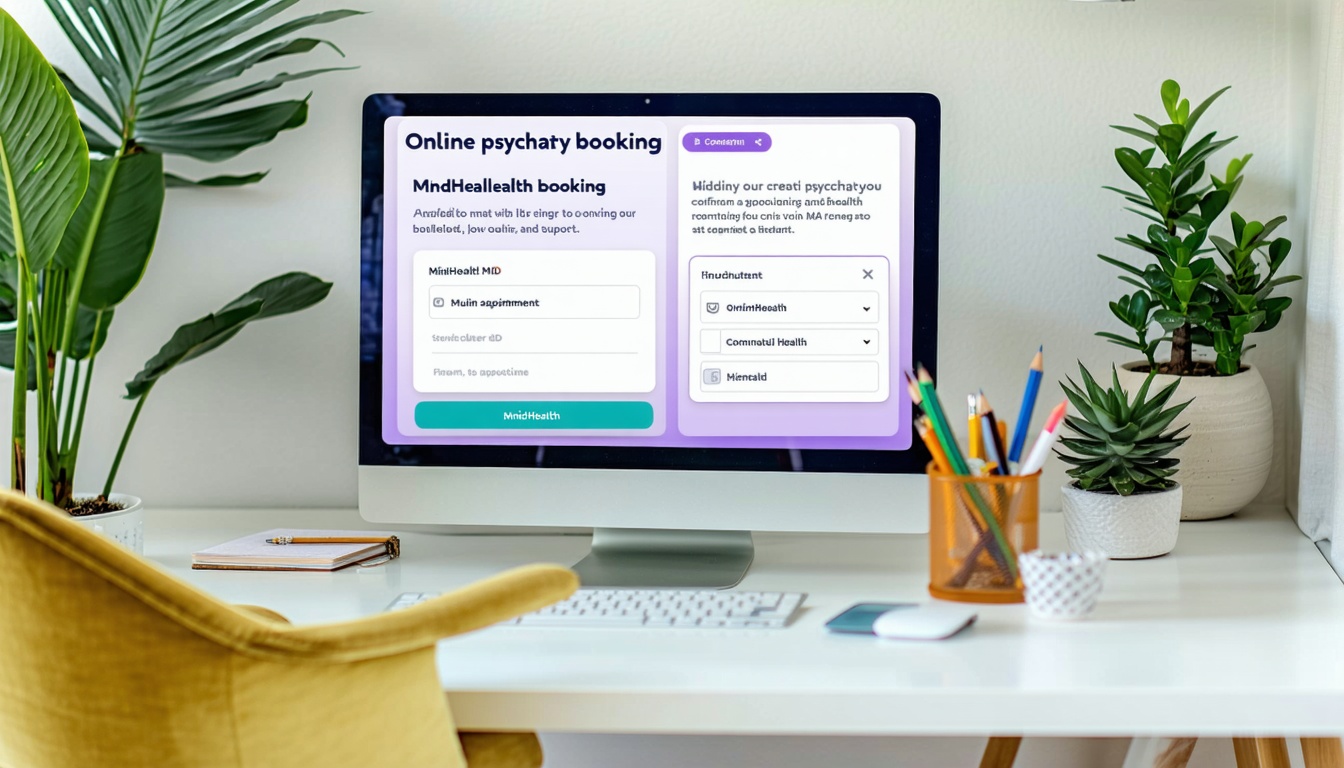Understand psychiatric stabilization
If you or a loved one is experiencing severe depression, intense anxiety, or signs of a mental health crisis, you might feel stuck and unsure about the next step. Psychiatric stabilization care can help you regain a sense of balance, guiding you toward safer ground before any issues escalate. This process is all about providing supportive interventions as soon as possible, so you can feel calmer and more capable of making clear decisions for long-term wellness.
During a crisis, everything can feel overwhelming. Even simple tasks, like getting out of bed, can require massive effort. In this difficult moment, you need a structured environment and specialized attention. That is where crisis stabilization services, inpatient programs, or short-term residential care can step in. Each approach aims to keep you safe, figure out underlying causes, and equip you with coping strategies for the future. You deserve care that looks beyond the immediate moment, helping you craft a reliable plan for ongoing support.
Choosing MindHealth MD for your psychiatric stabilization needs combines the reliability of professional mental health treatment with modern, convenient telehealth options. Whether you need immediate assistance, medication management, or technology-driven therapies like TMS, you can find peace of mind in a supportive, accessible space. By walking through the core ideas of psychiatric stabilization, you can discover how to get the right help fast, with minimal stress and maximum compassion.
Recognize the signs of a mental health crisis
A mental health crisis can creep up when you least expect it. You might be seeing warning signs in yourself or spotting alarming changes in a loved one. Have you noticed a sudden withdrawal from friends and family, an extreme sense of hopelessness, or even risk-taking behaviors? According to recent research, individuals may experience confused thinking, intense mood swings, or amplified fears that disrupt their normal routine [1].
Common indicators include:
- Suicidal thoughts or talk of self-harm
- Hallucinations or difficulty perceiving reality
- Rapid emotional shifts from sadness to anger
- Overuse of substances such as alcohol or drugs
- Feeling unable to manage daily life tasks
A crisis means your safety or the safety of your loved one is in jeopardy. Time matters. In these critical moments, having resources you can call upon right away is lifesaving. For many, that might mean checking into a Crisis Stabilization Unit, which offers a short but intensive period of help. Often, these facilities stabilize individuals within one to five days, then guide them back into the community with a plan of action [1].
One of the key advantages of psychiatric stabilization care is it can expand to fit the needs of those facing addiction or co-occurring disorders too. Sometimes, mental health issues overlap with substance use, creating an even more urgent situation. If you suspect that is the case, consider specialized services like a telehealth mat consultation or co occurring disorders treatment. These integrated approaches treat both the mental health condition and the substance use challenge at the same time.
Compare different stabilization options
When you first look at mental health treatment, you might see multiple choices: from quick crisis stabilization to hospital-based inpatient care or longer residential programs. Understanding the differences helps you pick the most suitable path.
Crisis stabilization units
- Length of stay: 1–5 days
- Purpose: Rapid stabilization, lower level of restriction compared to a hospital
- Best for: Individuals in acute crisis but without a need for extended hospitalization
Crisis Stabilization Units (CSUs) specialize in getting you or your loved one back on track fast. You receive immediate assessments, short-term therapy options, and coordination for aftercare. Clinicians address pressing risks, ensure medication is in place if needed, and then set you up for ongoing treatment.
Inpatient or residential care
- Length of stay: anywhere from a few weeks up to several months
- Purpose: Structured, 24/7 support for severe conditions
- Best for: Individuals requiring a safe environment to stabilize and begin deeper recovery
Inpatient programs are a strong choice if you’re dealing with severe mood disorders, psychosis, or life-threatening conditions. These stays range typically from 30 to 90 days, giving you time for intensive therapy and comprehensive assessment [2]. For the most severe mental health challenges, a longer stay can help stabilize symptoms before transitioning to outpatient or telehealth care.
Telehealth outpatient services
- Length of stay: flexible, ongoing appointments
- Purpose: Continued care while maintaining daily routines
- Best for: Individuals who are stable enough to remain at home but need consistent therapy and check-ins
Telehealth makes professional psychiatric support more accessible than ever. Through a secure platform, you can schedule a telepsychiatry appointment or a virtual psychiatry session without traveling. It is particularly helpful when you have family or work obligations that make hospital stays logistically challenging.
See how MindHealth MD supports psychiatric stabilization
If you want care that extends beyond immediate stabilization, MindHealth MD offers a comprehensive set of options. You might require swift assistance for a current crisis, or an ongoing schedule of therapy sessions, or medication adjustments. By choosing MindHealth MD, you can align with psychiatrists who understand the importance of getting help fast and also staying supported in the long run.
Here is what sets MindHealth MD apart:
- Flexible care from home: You can sign up for a same day psychiatric evaluation if you need urgent help.
- Focused interventions: Whether you need medication assisted treatment for substance use or specialized care for depression, there are targeted programs that meet you where you are.
- Continued telehealth approach: After addressing a crisis or completing a short-term inpatient program, you can keep building your stability through ongoing online appointments.
- Streamlined insurance process: MindHealth MD provides in network psychiatry care, which often reduces financial barriers and makes it simpler to get treatment.
Medical needs do not pause for inconvenience, so it helps to have easy-to-schedule virtual services. If you are ever feeling stuck, booking a short term psychiatry session or an online psychiatry booking can point you in the right direction.
Explore the role of medication assisted treatment
Medication Assisted Treatment (MAT) is a powerful tool for individuals battling opioid or alcohol dependency. It uses FDA-approved medications (like buprenorphine or naltrexone) alongside therapy to curb cravings and manage withdrawal. This blend keeps you more comfortable and lowers your chances of relapse in the early stages of recovery.
MindHealth MD recognizes that substance use often intertwines with mental health disorders. That is why you might want to explore either a mat for opioid addiction or a mat for alcohol dependency plan if you are facing both issues. Integrating MAT with therapy means you can target the root causes of addiction, dig into any co-occurring mental health disorders, and learn better ways to cope. By combining medication oversight, regular check-ins, and psychotherapy, MAT can lead to a steadier path toward feeling whole again.
When an individual also needs crisis stabilization, MAT can be an asset in preventing relapse once they leave a structured setting. For instance, if you transition from an inpatient program to telehealth care, continuing on medication can keep withdrawal symptoms under control. This stability allows you to fully engage in therapy sessions and form healthy coping habits.
Discover how TMS aids stabilization
While therapy and medication help many people, they do not work for everyone. If you have difficult-to-treat depression or have not responded well to medication, TMS, or Transcranial Magnetic Stimulation, could provide the breakthrough you are looking for. TMS uses magnetic pulses directed at specific regions of your brain related to mood regulation. It is noninvasive and has fewer side effects than some medications.
At MindHealth MD, you can schedule tms treatment to explore whether this innovative therapy is right for you. It is most commonly known as a depression treatment, but TMS has also shown promise for anxiety and other conditions. If you are tired of changing prescriptions with little relief, TMS might offer new hope. A tms therapy for depression approach also pairs well with telehealth psychiatry check-ins to ensure you are responding positively and adjusting treatments when needed.
For many individuals requiring psychiatric stabilization care, TMS can be a vital piece of the treatment puzzle. You get the chance to work closely with your psychiatrist to track progress, tweak treatments, and maintain momentum. With TMS in your plan, you could see faster relief from severe symptoms, helping you avoid repeated crisis-level episodes.
Emphasize personalized care and extended support
Stepping out of a crisis does not guarantee you will never return to that place again, unless you have an actionable plan for ongoing treatment. Once immediate risks have been lowered, your psychiatrist can collaborate with you on an extended approach that covers therapy, medications, and lifestyle boosts like exercise or stress reduction techniques.
With MindHealth MD, you can find:
- Thorough medication management: Making sure your prescriptions remain effective and adjusting them if side effects become problematic. You can learn more about it at psychiatric medication management.
- Counseling for co-occurring disorders: If depression, bipolar disorder, PTSD, or OCD intersects with substance use, try dual diagnosis psychiatric program or substance use psychiatry service.
- EEG-based insights: An eeg brain mapping test or an eeg diagnostic for mental health could uncover complex underlying patterns that help refine the trajectory of your treatment.
Structural support is everything after an initial stabilization, especially if you want to avoid repeated crises. This is where telehealth stands out. It ensures you can maintain consistent appointments, even after relocating or if personal obligations make it tough to travel. You can keep progress going by regularly checking in and adjusting your plan as new issues arise.
Manage crisis and next steps
It might feel scary to imagine yourself or a loved one in a mental health crisis, but there is encouragement in knowing resources are available. One in five Americans faces a mental illness each year, accounting for nearly 18.5% of the adult population [3]. If you find yourself in that 18.5%, consider that you are not alone, and you have many options for help.
Quick ways to stabilize
- Contact professional services: If the crisis is severe, call emergency services or go to the nearest CSU for immediate stabilization.
- Leverage telehealth solutions: You could request an immediate psychiatry appointment if you cannot wait for a traditional in-person slot.
- Engage community support: Friends, family, hotlines, and local support groups can provide emotional reassurance while you arrange professional help.
Transition to ongoing support
- Inpatient or partial hospitalization: If symptoms remain intense, a few weeks in a structured environment can be life-changing.
- Outpatient or telepsychiatry: Once stabilized, you can opt for a 48 hour psychiatry booking to maintain momentum.
- Medication management and therapy: Whether in person or through a virtual psychiatry session, keep tracking your symptoms to ensure your treatment remains on course.
A crisis often signals a deeper need for long-range support, such as exploring new therapy types or addressing any undiagnosed conditions. Deeper programs can last months, offering multiple therapy formats: cognitive behavioral therapy, dialectical behavior therapy, or holistic practices like art and yoga [3].
Know your legal rights and involuntary care
Sometimes a person is hospitalized involuntarily if they present a danger to themselves or others. While this might feel alarming, it prevents further harm and allows for urgent infrastructure. Depending on state laws, you or your loved one may have to stay in an inpatient unit until you are deemed stable enough for outpatient or telehealth. High levels of supervision often make significant medication changes safer, particularly when it comes to adjusting antipsychotic regimens or trying a new antidepressant [4].
Mental hospitals specialize in severe illnesses like major depressive disorder, schizophrenia, bipolar disorder, OCD, and PTSD. This form of care involves a high level of structure but is not perfect for everyone. Some individuals are better served in a more flexible residential setting after initial stabilization. If you worry involuntary care will cut you off from home or work responsibilities for too long, consult with your psychiatrist about less restrictive alternatives, like partial hospitalization or an intensive outpatient option.
Build confidence with practical tips and self-care
One essential ingredient in psychiatric stabilization is self-care. While consistent check-ins and medication might prove vital, you also hold the power to reduce stress, set goals, and lean on your support system. Here are a few strategies you can incorporate in your everyday life:
- Practice mindfulness: Devote a few minutes daily to something soothing, such as guided meditation or slow breathing exercises.
- Nourish your body: Balanced nutrition and regular physical activity keep you feeling stronger overall.
- Track your moods: Jot down a quick note in a journal or mood-tracking app. Spotting patterns can help you identify triggers before they boil over.
- Reach out: Isolation can deepen anxiety, depression, and hopelessness. Talk to friends, join a local or virtual support group, or contact your care team for wisdom and comfort.
- Seek small wins: Break tasks into manageable pieces, and celebrate every step you complete, whether it is washing dishes or sending a single text message.
Combining self-care with clinical strategies amplifies your body and mind’s resilience. If you find it hard to do these tasks alone, consider scheduling a consultation for book psychiatric appointment. A trained professional can help break down obstacles, making these helpful habits part of your routine.
Consider the long-term benefits of stabilization
Psychiatric stabilization care can feel like a big step. Yet, think of it as an investment in your overall life trajectory. Once you or your loved one moves past the crisis and engages in consistent follow-up, you may experience:
- Fewer emergency visits or unexpected breakdowns
- Healthier personal relationships
- Less disruption to your work or finances
- Stronger self-esteem and sense of accomplishment
Long-term programs, such as those lasting over several months, are particularly helpful if you have chronic conditions like severe depression or psychosis [2]. Extended stays allow you to practice new coping skills, test them out in real-life scenarios, and refine your approach. On the other hand, short-term intensive stabilization (often 7 days or less) is incredibly useful if your primary need is immediate balance. Afterward, you can proceed to a continuous, lower-intensity format through telehealth.
Some people find success in a combination approach. For instance, you could start with a brief stabilization, then enter a specialized program focusing on deeper healing. By layering these services, you get the best of both worlds: immediate safety plus structured, gradual transformation that reduces the likelihood of returning to crisis mode.
Frequently asked questions
-
What is psychiatric stabilization care?
Psychiatric stabilization care is a short-term approach to help individuals regain emotional balance during a mental health crisis. You receive immediate interventions, which might include therapy, medication adjustments, or an inpatient stay, to stabilize symptoms before stepping down to less intensive treatment. -
How long does crisis stabilization usually last?
Crisis stabilization can last anywhere from a day or two up to a week, depending on how quickly you respond to treatment. More extended inpatient programs might range from 30 days to several months if the symptoms are severe. -
Is telehealth effective for stabilization follow-up?
Yes. Telehealth enables flexible appointments with psychiatrists and therapists, which can be especially useful if you have job or family commitments. By maintaining consistent virtual sessions, you reduce the risk of relapse because you never have to wait weeks for your next check-in. -
Can I receive medication assisted treatment for addiction during stabilization?
Absolutely. Many stabilization programs, including those at MindHealth MD, offer MAT if you struggle with substance use and mental health concerns. Combining medication, therapy, and supportive services treats the whole person so you can start healing more effectively. -
What happens after I complete psychiatric stabilization?
After stabilization, you typically transition to either outpatient treatment, telehealth psychiatry, or a residential program, depending on your condition. You keep seeing a psychiatrist or counselor for more in-depth therapy, medication management, and long-term recovery strategies.
Move toward lasting peace of mind
Taking the leap to address a mental health crisis can feel daunting, but it often provides the relief you and your loved ones need. Psychiatric stabilization care offers a structured, comforting path to de-escalate dangerous symptoms and set you on a healthier journey. By partnering with MindHealth MD, you also gain access to innovative approaches such as TMS, integrated MAT for substance use, and telehealth follow-ups that accommodate your life.
Stability happens in steps. Maybe you begin with a quick same day psychiatric evaluation, transition to a short-term crisis treatment plan, and then continue your recovery with weekly virtual sessions. Whichever way you proceed, the goal is the same: ensuring your mind, body, and spirit get the nourishment they need to thrive.
If you or a loved one is ready for a breakthrough, consider exploring MindHealth MD’s flexible offerings. From in network tms providers to a how to start mat program guide, you can find a personalized plan that suits your needs. Many mental health challenges can feel isolating and urgent, but remember you do not have to face them alone. By seeking reliable and compassionate care, you set the stage for a life rooted in resilience and hope. And that is a step worth celebrating.








